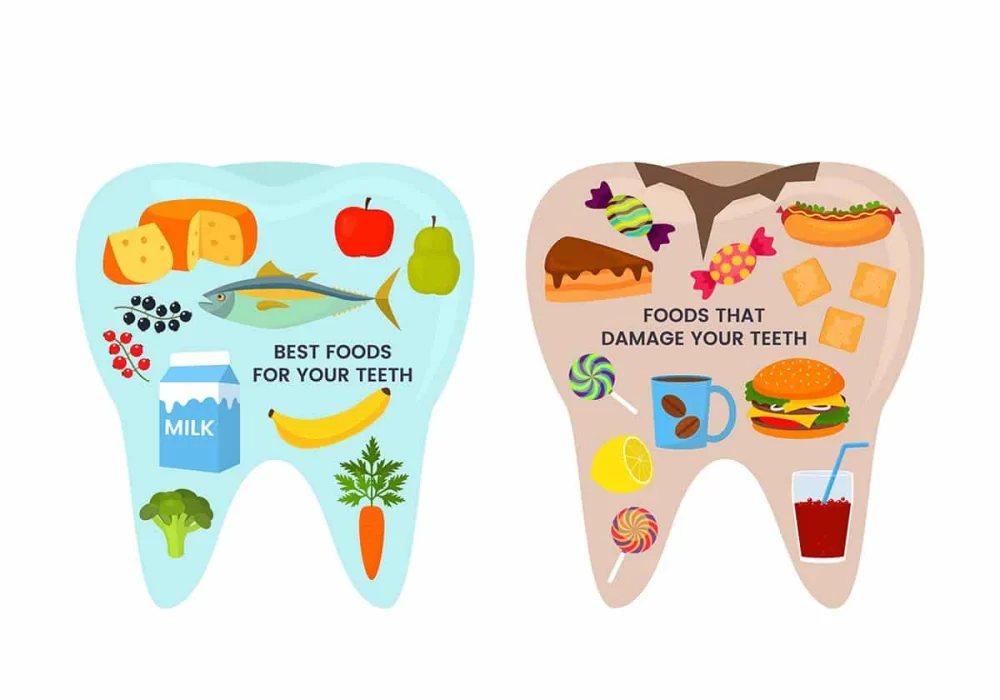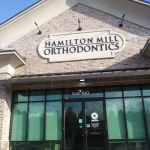
- Importance-of-Nutrition-for-Oral-Health
- Key-Nutrients-for-Strong-Teeth-and-Gums
- Foods-to-Include-in-Your-Diet
- Foods-to-Limit-for-Optimal-Dental-Health
- Real-Life-Examples-and-Personal-Insights
- How-to-Support-Your-Diet-with-Proper-Oral-Care
1. Importance of Nutrition for Oral Health
When considering oral health, many people focus on brushing and flossing, but the foundation for healthy teeth and gums begins with what you eat. The best diet for healthy teeth and gums is not just about avoiding cavities; it supports the entire oral ecosystem—enamel strength, gum resilience, and even the balance of bacteria in the mouth. Proper nutrition can prevent gum disease, tooth decay, and even reduce inflammation that might contribute to more serious dental issues.
Scientific research increasingly shows that a nutrient-rich diet supports the body’s ability to fight infection and maintain tissue health, which is critical for the gums. For example, diets high in processed sugars and acidic drinks contribute to enamel erosion and gum inflammation. On the other hand, consuming foods with essential vitamins and minerals can help maintain the structural integrity of teeth and encourage healthy gum tissue. Understanding this connection is key to building an effective diet plan that benefits your oral health long-term.
1.1 How Diet Affects Oral Microbiome
The balance of bacteria in your mouth, known as the oral microbiome, plays a vital role in oral health. A diet high in refined sugars and processed foods encourages harmful bacteria growth, which leads to plaque buildup and gum disease. Conversely, foods rich in fiber and antioxidants promote beneficial bacteria, creating a protective environment against decay and infection.
1.2 Role of Hydration in Oral Health
Water is often overlooked but is essential for maintaining saliva production. Saliva acts as a natural cleanser, washing away food particles and neutralizing acids. Staying hydrated with water—not sugary beverages—supports this natural defense mechanism and enhances the benefits of a tooth-friendly diet.
2. Key Nutrients for Strong Teeth and Gums
Identifying the right nutrients is fundamental to crafting the best diet for healthy teeth and gums. Several vitamins and minerals stand out due to their direct impact on oral tissues.
2.1 Calcium and Phosphorus: The Building Blocks of Teeth
Calcium is famously essential for maintaining strong bones and teeth. It helps rebuild enamel and supports bone density in the jaw. Phosphorus works alongside calcium to strengthen the tooth enamel and protect against decay. Dairy products like milk and cheese, as well as leafy greens and almonds, are excellent sources of these minerals.
2.2 Vitamin D: The Enabler of Calcium Absorption
Without adequate Vitamin D, the body struggles to absorb calcium effectively. This vitamin is vital in preventing tooth loss and promoting gum health by reducing inflammation. Natural sunlight exposure and foods like fatty fish, egg yolks, and fortified products help maintain healthy Vitamin D levels.
2.3 Vitamin C: Essential for Gum Health
Vitamin C is crucial for collagen production, which supports the structure and repair of gum tissue. A deficiency in Vitamin C can lead to bleeding gums and gum disease. Citrus fruits, strawberries, bell peppers, and broccoli are rich sources that should be regularly included in the diet.
2.4 Antioxidants and Polyphenols: Protecting Against Inflammation
Foods rich in antioxidants help combat oxidative stress and inflammation in the gums, which are primary contributors to periodontal disease. Green tea, berries, nuts, and dark chocolate (in moderation) contain compounds that support gum health.
3. Foods to Include in Your Diet for Optimal Oral Health
Now that we understand the nutrients critical for oral health, let's explore specific foods that embody the best diet for healthy teeth and gums.
3.1 Crunchy Vegetables and Fruits
Carrots, celery, apples, and cucumbers require chewing that stimulates saliva flow, which naturally cleanses the mouth. Their fibrous texture also gently scrubs the tooth surface, reducing plaque buildup. For example, a daily habit of snacking on crunchy veggies can significantly reduce dental plaque, a fact supported by many dental health professionals.
3.2 Dairy Products
Cheese, yogurt, and milk not only provide calcium and phosphorus but also help neutralize acids produced by bacteria in the mouth. This double effect makes dairy an essential component of the best diet for healthy teeth and gums.
3.3 Nuts and Seeds
Almonds, walnuts, and pumpkin seeds offer healthy fats and minerals such as magnesium and calcium. These promote enamel strength and overall oral tissue health. Additionally, nuts stimulate saliva, which is critical for maintaining oral pH balance.
3.4 Whole Grains
Whole grains contain complex carbohydrates and B vitamins that support healthy gums. Unlike refined grains, whole grains have a low glycemic index, reducing the risk of cavities by limiting sugar spikes that feed harmful bacteria.
4. Foods to Limit for Optimal Dental Health
While including tooth-friendly foods is essential, equally important is knowing which foods to avoid or limit to protect your oral health.
4.1 Sugary Snacks and Drinks
Sugars are the primary fuel for cavity-causing bacteria. Consuming sugary sodas, candies, and desserts frequently increases acid production that erodes enamel. A well-known case involved a popular soda brand being linked to a rise in dental decay in adolescents, highlighting the public health impact of sugary drinks.
4.2 Acidic Foods and Beverages
Citrus juices, wine, and carbonated drinks have a high acid content that can wear down enamel. Drinking these beverages through a straw and rinsing with water afterward can minimize damage, but limiting intake is best.
4.3 Sticky and Processed Foods
Sticky candies and processed snacks tend to cling to teeth, prolonging exposure to sugars and acids. They are particularly harmful if oral hygiene is inadequate. Opting for natural snacks like fresh fruit or nuts is a healthier alternative.
5. Real-Life Examples and Personal Insights on Oral Health Diets
Consider Sarah, a 32-year-old teacher who struggled with frequent gum inflammation. After consulting with a dentist and adjusting her diet to include more leafy greens, dairy, and nuts while cutting back on sugary snacks, she noticed remarkable improvement within months. Her story mirrors countless others who find that dietary changes significantly boost their oral health alongside routine dental care.
Another example comes from a well-publicized dental health campaign that targeted children’s sugar consumption. Schools that implemented nutrition education saw a measurable decline in cavities and gum problems, proving the profound impact of diet on dental health.
From a personal perspective, adopting a balanced diet that supports oral health is less about restrictive eating and more about smart, enjoyable choices. For example, substituting a sweet snack with an apple and cheese plate offers pleasure and nourishment simultaneously, making the best diet for healthy teeth and gums sustainable long term.
6. How to Support Your Diet with Proper Oral Care
While the best diet for healthy teeth and gums lays the foundation, it works best when paired with excellent oral hygiene practices. Brushing twice daily with fluoride toothpaste, flossing to remove plaque from between teeth, and regular dental check-ups ensure that your nutritional efforts translate into real, visible improvements.
Additionally, to complement your diet, Dentistry Toothtruth offers tailored recommendations for dental care products and services that enhance oral health. Whether you need the right toothbrush, fluoride treatments, or professional advice on diet and dental care, their expert guidance can help you maintain a healthy smile.
In conclusion, the best diet for healthy teeth and gums is a balanced one, rich in essential nutrients like calcium, vitamin D, and vitamin C, paired with smart food choices and good hydration. Coupled with diligent oral hygiene, this approach not only protects your smile but contributes to your overall health and confidence.







 Dentistry At Suburban Square: Michael I. Wollock, DMD4.0 (1228 review)
Dentistry At Suburban Square: Michael I. Wollock, DMD4.0 (1228 review) River Run Dental4.0 (469 review)
River Run Dental4.0 (469 review) Total Dentistry-Streamwood4.0 (26 review)
Total Dentistry-Streamwood4.0 (26 review) HealthPartners Dental Specialty Center Woodbury - Lake Elmo3.0 (38 review)
HealthPartners Dental Specialty Center Woodbury - Lake Elmo3.0 (38 review) Mission Hills Dentistry4.0 (1161 review)
Mission Hills Dentistry4.0 (1161 review) Hamilton Mill Orthodontics4.0 (27 review)
Hamilton Mill Orthodontics4.0 (27 review) The Importance of Oral Health Education During Pregnancy for a Healthy Pregnancy
The Importance of Oral Health Education During Pregnancy for a Healthy Pregnancy Best Tips for Brushing Your Teeth Properly for Healthy Gums: Essential Techniques for Oral Health
Best Tips for Brushing Your Teeth Properly for Healthy Gums: Essential Techniques for Oral Health Why Skipping Dental Checkups Can Lead to Bigger Oral Health Problems
Why Skipping Dental Checkups Can Lead to Bigger Oral Health Problems Advantages of Porcelain Dental Restorations
Advantages of Porcelain Dental Restorations How Can Diabetes Cause Tooth and Gum Problems? Preventing and Managing Oral Health Issues
How Can Diabetes Cause Tooth and Gum Problems? Preventing and Managing Oral Health Issues Healthy Habits for Promoting Good Oral Health and Hygiene: Tips for a Healthy Smile
Healthy Habits for Promoting Good Oral Health and Hygiene: Tips for a Healthy Smile